- Home
- Scott Turow
Presumed innocent kc-1 Page 2
Presumed innocent kc-1 Read online
Page 2
I laugh out loud, but Nico goes on: "I was relieved. I'm telling you the truth. I was relieved when Raymond announced. I'd seen it coming: Horgan holds a big press conference, says he's hanging it up, but he's asked his top assistant to carry on. Media is going to love Rusty Sabich. A non-political guy. A professional prosecutor. Stable. Mature. Somebody everyone can depend on. The man who broke up the Night Saints. They play all that stuff and Raymond brings Bolcarro in behind you. You'd've been tough, very tough."
"Ridiculous," I say, manfully pretending that like scenarios have not described themselves to my imagination on a hundred occasions in the last year. "You're really something, Delay," I tell him. "Divide and conquer. You'll just never stop."
"Hey listen, my friend," he says, "I am one of your true admirers. I mean that. There are no hard feelings here." He touches his shirt above the vest. "That is one of the few things that's going to stay the same when I get there. You'll still be in the chief deputy's office."
I tell him, affably, that's a bunch of crap.
"You'll never be P.A.," I say, "and if you were, Tommy Molto would be your guy. Everybody knows you have Tommy in the woodshed now."
Tommy Molto is Nico's best friend, his former second-in-command in the Homicide Section. Molto has been a no-show in the office for three days. He hasn't called in and his desk is clean. The common belief is that when the furor over Carolyn's death abates a bit next week, Nico will stage another media occasion and announce that Tommy has joined his campaign. It will provoke a few more headlines. DISAPPOINTED HORGAN DEPUTY BACKS NICO. Delay handles these things well. Raymond has a fit whenever he hears Tommy's name. "Molto?" Nico asks me now. His look of innocence is entirely unconvincing, but I do not get the chance to respond. At the lectern, the reverend has asked the mourners to assume their seats. Instead, I smile at Della Guardia's smirk, in fact-as we are parting, and begin buffeting my way toward the front of the chapel, where Raymond and I are supposed to sit as office representatives. But as I go, making restrained gestures of acknowledgment to the people that I know, the heat of all of Nico's forceful confidence is still upon me. It is like having come in out of the blazing sun: the skin tingles and remains tender to the touch. And it strikes me then abruptly, as I gain my first clear view of the pewter-colored casket, that Nico Della Guardia actually may win. This prophecy is announced by a small voice somewhere in my interior reaches, only loud enough, like some whining conscience, to tell me what I do not want to hear. Undeserving as Nico is, unqualified, a pygmy in his soul, something may be propelling him toward triumph. Here, in this region of the dead, I cannot help but recognize the carnal appeal of his vitality and how far it is bound to take him.
In keeping with the character of this public occasion, two rows of folding chairs have been positioned next to Carolyn's coffin. They are occupied, for the most part, by the dignitaries you would expect. The only unfamiliar figure is a boy in his late teens who is seated beside the mayor, directly at the foot of the bier. This young man has a poorly barbered tangle of blondish hair and a necktie drawn too tight, so that the collar points on his rayon shirt are lifted in the air. A cousin, I decide, perhaps a nephew, but definitely-and surprisingly-family. Carolyn's people, as I understood it, were all back East, where she meant to leave them long ago. Beside him in the front row, there are more of the mayor's people than there should be, and no room is left for me. As I pass in the row behind Horgan, Raymond leans back. He has apparently observed my talk with Della Guardia.
"What did Delay have to say for himself?"
"Nothing. Bullshit. He's running out of money."
"Who isn't?" Raymond asks.
I inquire about the meeting with the mayor, and Horgan rolls his eyes. "He wanted to give me some advice, just in confidence, me and him, because he doesn't want to appear to be taking sides. He thinks it would help my chances a lot if we arrested Carolyn's murderer before Election Day. Can you believe that jagoff. And he said it with a straight face, too, so I couldn't walk out on him. He's having a great time." Raymond points. "Look at him up there. The chief mourner." Raymond as usual cannot contain himself about Bolcarro. I look around, hoping we have not been overheard. I chuck my face toward the young man seated beside the mayor.
"Who is the kid?" I ask.
I do not think I have understood Horgan's answer, and I lean closer. Raymond brings his face right to my ear. "Her son," he says again.
I stand up straight.
"Grew up with his father in New Jersey," Raymond says, "then came out here for college. He's over at the U."
Surprise seems to drive me backward. I murmur something to Raymond and push down the row toward my seat at the end, between two sizable floral arrangements on pedestals. For an instant I am certain that this lightheaded moment of shock has passed, but as an unexpectedly bold tone forges from the organ immediately behind me, and the reverend speaks his first words of address, my amazement deepens, ripples, and somehow takes on the infected hurt of real sorrow. I did not know. I feel a sort of shimmering incomprehension. It does not seem plausible that she could have kept a fact like this to herself. The husband I had long ago surmised, but she never made mention of a child, let alone one nearby, and I must stifle an immediate instinct to leave, to remove myself from this theater darkness for the sobering effect of strong light. As a matter of will, I urge myself, after a few moments, to attend to what is present.
Raymond has arrived at the podium; there has been no formal introduction. Others-the Reverend Mr. Hiller, Rita Worth from the Women's Bar Association-have spoken briefly; but now a sudden gravity and portentousness comes into the air, a current strong enough to wrest me from my sense of grievance. The hundreds here grow stiller. Raymond Horgan has his shortcomings as a politician, but he is a consummate public man, a speaker, a presence. Balding, growing stout, standing there in his fine blue suit, he broadcasts his anguish and his power like a beaconed emission.
His remarks are anecdotal. He recalls Carolyn's hiring over the objections of more hard-bitten prosecutors who regarded probation officers as social workers. He celebrates her toughness and her flint. He remembers cases that she won, judges she defied, archaic rules she took pleasure in seeing broken. From Raymond, these stories have a soulful wit, a sweet melancholy for Carolyn and all of her lost courage. He really has no equal in a setting like this, just talking to people about what he thinks and feels. For me, though, there is no quick recovery from the disorder of the moments before. I find all of it-the hurt, the shock, the piercing force of Raymond's words, my deep, my unspeakable sorrow-welling up, pushing at the limits of tolerance and a composure I desperately need to maintain. I bargain with myself. I will not go to the interment. There is work to do, and the office will be represented. The secretaries and clerks, the older ladies who always criticized Carolyn's airs and are here now, crying in the front rows, will be pressed close at the graveside, weeping over one more of life's endless desolations. I will let them observe Carolyn's disappearance into open ground.
Raymond finishes. The impressive register of his performance, witnessed by so many who regard him as beleaguered, sets a palpable stir in the auditorium as he strides toward his seat. The reverend recites the details of the burial, but I let that pass. I am resolved: I will go back to the office. As Raymond wishes, I will resume the search for Carolyn's killer. Nobody will mind-least of all, I think, Carolyn herself. I have already paid her my respects. Too much so, she might say. Too often. She knows, I know, that I have already done my grieving over Carolyn Polhemus.
Chapter 2
The office has the bizarre air of calamity, of things badly out of place. The halls are empty, but the phones are pealing in wearying succession. Two secretaries, the only ones who stayed behind, are sprinting up and down the corridors putting callers on hold.
Even in the best of times, the Office of the Kindle County Prosecuting Attorney has a dismal aspect. Most deputies work two to an office in a space of Dickensian grimness. The Kindle Count
y Building was erected in 1897 in the emerging institutional style of factories and high schools. It is a solid red-brick block dressed up with a few Doric columns to let everybody know it is a public place. Inside, there are transoms; over the doors and dour casement windows. The walls are that mossy hospital green. Worst of all is the light, a kind of yellow fluid, like old shellac. So here we are, two hundred harried individuals attempting to deal with every crime committed in a city of one million, and the surrounding county, where two million people more reside. In the summer we labor in jungle humidity, with the old window units rattling over the constant clamor of the telephones. In the winter the radiators spit and clank while the hint of darkness never seems to leave the daylight. Justice in the Middle West. In my office, Lipranzer is waiting for me like a bad guy in a Western, hidden as he sits behind the door.
"Everybody dead and gone?" he asks.
I comment on his sentimentality and throw my coat down on a chair. "Where were you, by the way? Any copper with five years' service showed."
"I'm no funeralgoer," Lipranzer says dryly. There is, I decide, some significance in a homicide dick's distaste for funerals, but the connection does not come to me immediately and so I let the idea go. Life in the workplace: so many signs of the hidden world of meanings elude me in a day, bumps on the surface, shadows, like creatures darting by.
I attend to what is present. On my desk there are two items: a memo from MacDougall, the chief administrative deputy, and an envelope Lipranzer has placed there. Mac's memo simply says, "Where is Tommy Molto?" It occurs to me that for all of our suspicions of political intrigue, we should not ignore the obvious: someone ought to check the hospitals and Tommy's apartment. One deputy PA is dead already. That is the reason for Lipranzer's envelope. It bears a label typed by the police lab: OFFENDER: UNKNOWN. VICTIM: C. POLHEMUS.
"Did you know that our decedent left an heir?" I ask as I'm looking for the letter opener.
"No shit," says Lip.
"A kid. Looked to be eighteen, twenty. He was at the funeral."
"No shit," Lip says again, and considers his cigarette. "You figure one thing about goin to a funeral is at least no surprises."
"One of us ought to talk to him. He's at the U."
"Get me an address, I'll see him. 'Anything Horgan's guys want.' Morano gave me that crock again this mornin." Morano is the police chief, an ally of Bolcarro's. "He's waitin to see Raymond fall on his ass."
"Him and Nico. I bumped into Delay." I tell Lip about our visit. "Nico's really high on himself. He even made me believe it for a minute."
"He'll do better than people say. Then you'll be kickin yourself in the ass, thinkin you should have run."
I make a face: who knows? With Lip, I do not have to bother with more. For my fifteenth college reunion I received a questionnaire which asked a lot of personal questions I found difficult to answer: What contemporary American do you admire most? What is your most important physical possession? Name your best friend and describe him. On this one, I puzzled for some time, but I finally wrote down Lipranzer's name. 'My best friend,' I wrote, 'is a cop: He is five foot eight inches tall, weighs 120 pounds after a full meal, and has a duckass hairdo and that look of lurking small-time viciousness that you've seen on every no-account kid hanging on a street corner. He smokes two packs of Camel cigarettes a day. I do not know what we have in common, but I admire him. He is very good at what he does.'
I first ran across Lip seven or eight years ago, when I was initially assigned to the Violence Section and he had just begun working Homicide. We have done a dozen cases since, but there are still ways in which I regard him as a mystery, even a danger. His father was a watch commander in a precinct in the West End, and when his old man died, Lip left college to take up a place that came to him by rights of a kind of departmental primogeniture. By now he has been placed in the P.A.'s office on direct assignment, a so-called Special Command. On paper, his job is to act as police liaison, coordinating homicide investigations of special interest to our office. In practice, he is as solitary as a shooting star. He reports to a Captain Schmidt, who cares only that he has sixteen homicide collars to show at the end of every fiscal year. Lip spends most of this time alone, hanging out in bars and on loading docks, drinking shots with anybody who's got good information-hoods, reporters, queers, federal agents, anybody who can keep him up to speed on the world of big-time bad guys. Lipranzer is a scholar of the underlife. Eventually, I have come to recognize that it is the weird weight of that information that somehow accounts for his rheumy-eyed sulking look.
I still have the envelope in my hands.
"So what do we have here?" I ask.
"Path report. Three-sheet. Bunch of pictures of a naked dead lady." The three-sheet is the prosecutor's copy of the arriving officers' reports-he third leaf in the carbon layers. I have talked to these cops directly. I go on to the report of the police pathologist, Dr. Kumagai, a weird-looking little Japanese who seems to have come out of a forties propaganda piece. He is known as Painless, a notorious hack. No prosecutor calls him to the witness stand without crossing his fingers.
"And what's the scoop? Male fluids in every hole?"
"Just the main one. Lady is dead of a skull fracture and resulting hemorrhage. Pictures might make you think she was strangled, but Painless says there was air in her lungs. Anyway, the guy musta hit her with somethin. Painless has got no idea what. Heavy, he says. And real hard."
"I take it we looked for a murder weapon in the apartment?"
"Turned the place upside down."
"Anything obvious missing? Candlesticks? Bookends?"
"Nothin. I sent three separate teams through."
"So," I say, "our man showed up already thinking he'd be doing some heavy hitting."
"Could be. Or else he just took what he used with him. I'm not positive this guy came prepared. Seems like he was hittin to subdue her-didn't realize he cooled her. I figure-you can see when you look at the pictures-that the way the ropes were tied, that he put himself between her legs and was tryin to let his weight strangle her. It's all slip-knotted. I mean," Lipranzer says, "that he was sort of tryin to fuck her to death."
"Charming," I say.
"Definitely charming," says lip. "This was a very charming type fellow." We are both quiet a moment before he goes on. "We got no bruises on the arms, hands, nothin like that," Up says. That would mean there was no struggle before Carolyn was bound. "Contusion's rear right. It's got to be that he hit her from behind, then tied her up. Only it seems strange that he would knock her cold to start with. Most of these creeps like em to know what they're doin."
I shrug. I'm not so sure of that.
The photos are the first thing I take out of the envelope. They are clean, full-colored shots. Carolyn lived in a place on the waterfront, a former warehouse parceled into "loft condominiums." She had divided the space with Chinese screens and heavy rugs. Her taste ran to the modern, with elegant touches of classical and antique. She had been killed in the space off the kitchen which she used as a living room. An overall shot of that area is first on the stack. The thick green-edged glass top of a coffee table has been tumbled off its brass props; a modular seating piece is upside down. But overall I agree with Lip that there is less sign of struggle than I have seen on other occasions, particularly if you ignore the bloodstain worked into the fiber of the flokati rug so that it has the shape of a large soft cloud. I look up. I do not feel I am ready yet to take on the photos of the corpse.
"What else does Painless tell us?" I ask.
"This guy was shootin blanks."
"Blanks?"
"Oh yeah. You'll like this." Lipranzer does his best to repeat Kumagai's analysis of the sperm deposit that was found. Little of it had seeped to the labia, which means that Carolyn could not have spent much time on her feet after sexual contact. This is another way we know that the rape and her death were roughly contemporaneous. On April 1, she had left the office a little after seven. Kumaga
i puts the time of death at somewhere around nine.
"That's twelve hours before the body's found," Lip says. "Painless says normally, with that kinda time span, he'd still see some of the guy's little thingies swimmin upstream in the tubes and in the womb, when he looked under the microscope. Instead, this guy's wad's all dead. Nothin went nowhere. Painless figures this guy is sterile." Lip pronounces the word so that it rhymes with pearl. "Says you can get like that from mumps."
"So we're looking for a rapist who has no children and once had the mumps?"
Lipranzer shrugs.
"Painless says he's gonna take the semen specimen and send it over to the forensic chemist. Maybe they can give him another idea of what's up." I groan a little bit at the thought of Painless exploring the realms of higher chemistry.
"Can't we get a decent pathologist?" I ask.
"You got Painless," Lip says innocently.
I groan again, and leaf through a few more pages of Kumagai's report. "Do we have a secreter?" I ask. People are divided not merely by blood type but by whether they secrete identifying agents into their body fluids.
Lip takes the report from me. "Yep."
"Blood type?"
"A."
"Ah," I say, "my very own."
"I thoughta that," says Lip, "but you got a kid."
I again comment on Lipranzer's sentimentality. He does not bother to respond. Instead, he lights another cigarette and shakes his head. I'm just not grabbin it yet," he says. "The whole goddamn deal is too weird. We're missin somethin."
So we begin again, the investigators' favorite parlor game, who and why. Lipranzer's number-one suspicion from the start has been that Carolyn was killed by someone she convicted. That is every prosecutor's worst fantasy, the long-nurtured vengeance of some dip you sent away. Shortly after I was first assigned to the jury trial section, a youth, as the papers would have it, by the name of Pancho Mercado, took exception to my closing argument, in which I had questioned the manliness of anyone who made his living by pistol-whipping seventy-seven year-old men. Six foot four and well over 250 pounds, Pancho leaped the dock and thundered behind me through most of the courthouse before he was stopped cold in the P.A.'s lunchroom by MacDougall, wheelchair and all. The whole thing ended up on page 3 of the Tribune, with a grotesque headline: PANICKED PROSECUTOR SAVED BY CRIPPLE. Something like that. Barbara, my wife, likes to refer to this as my first famous case. Carolyn worked on stranger types than Pancho. For several years she had headed what is called the office's Rape Section. The name gives a good idea of what is involved, although all forms of sexual assault tend to be prosecuted there, including child abuse, and one case I can recall where an all-male menage-a-trois had turned rough and the state's main witness had ended the evening with a light bulb up his rectum. It is Lipranzer's hypothesis, at moments, that one of the rapists Carolyn prosecuted got even.

 Testimony
Testimony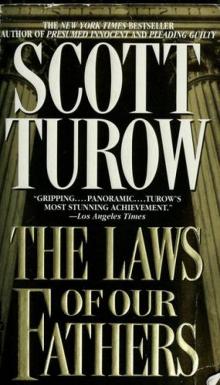 The Laws of Our Fathers
The Laws of Our Fathers Ordinary Heroes
Ordinary Heroes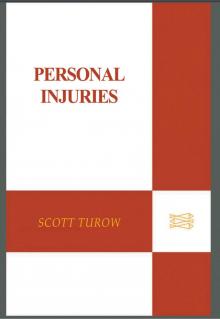 Personal Injuries
Personal Injuries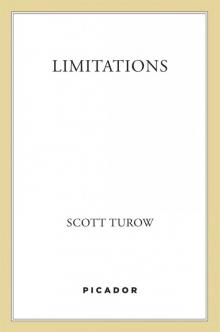 Limitations
Limitations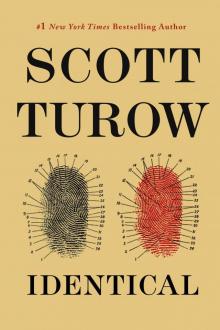 Identical
Identical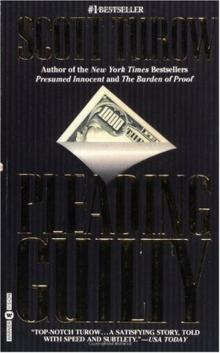 Pleading Guilty
Pleading Guilty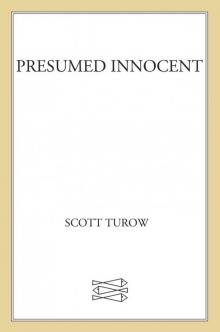 Presumed Innocent
Presumed Innocent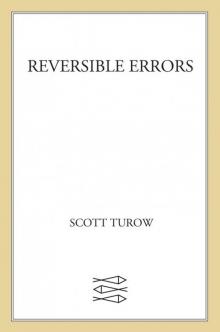 Reversible Errors
Reversible Errors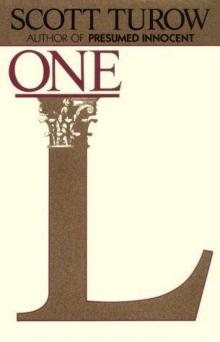 One L: The Turbulent True Story of a First Year at Harvard Law School
One L: The Turbulent True Story of a First Year at Harvard Law School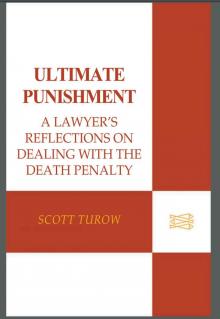 Ultimate Punishment
Ultimate Punishment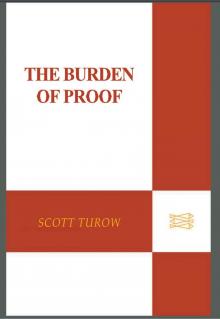 The Burden of Proof
The Burden of Proof Ordinary Heroes (2005)
Ordinary Heroes (2005)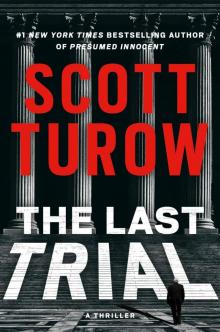 The Last Trial
The Last Trial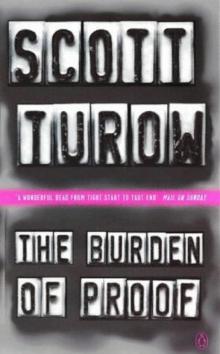 The Burden of Proof kc-2
The Burden of Proof kc-2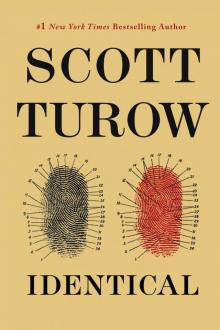 KC09 - Identical
KC09 - Identical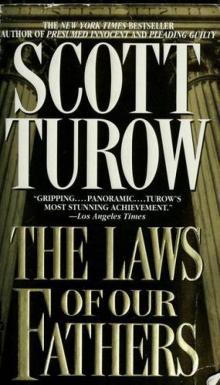 The Laws of our Fathers kc-4
The Laws of our Fathers kc-4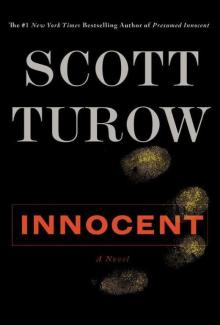 Innocent kc-8
Innocent kc-8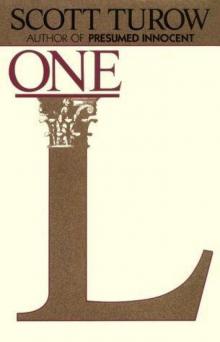 One L
One L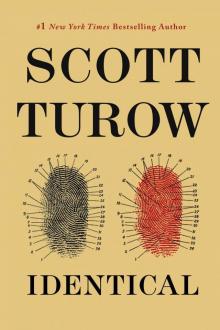 Identical kc-9
Identical kc-9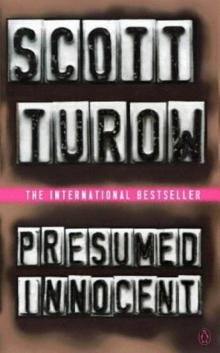 Presumed innocent kc-1
Presumed innocent kc-1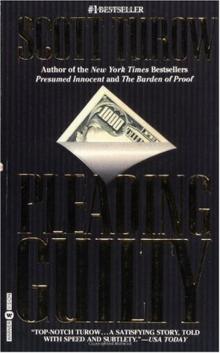 Pleading Guilty kc-3
Pleading Guilty kc-3 One L (1977)
One L (1977)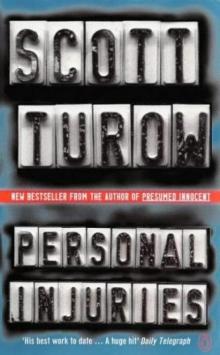 Personal injuries kc-5
Personal injuries kc-5